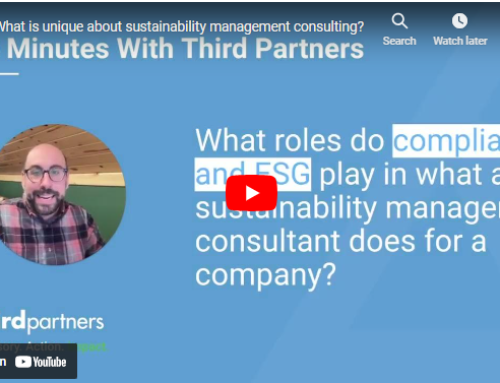Case Study: Environmental marketing Ccaims validation for Batiste Rhum
Overview
Batiste Rhum, “The First Sustainable American Craft Rum,” sought third-party validation of its environmental marketing claims. The company engaged Third Partners, who reviewed its existing carbon footprinting analysis and provided additional analysis and revisions where appropriate. Third Partners validated the claim that Batiste Rhum’s production process is climate positive, meaning that its process captures more carbon from the atmosphere than it emits.
Client Needs
Batiste Rhum designed its production process to maximize sustainability, through a combination of strategies, such as sustainable farming techniques (e.g., leaving organic waste material on the ground as weed control, instead of using synthetic herbicides), renewable energy, and single distillation. Prior to engaging Third Partners, Batiste Rhum conducted an internal analysis of its own carbon footprint and estimated that the company’s operations – from growing sugarcane in Guadeloupe through bottling and labeling the finished product in California – are better than carbon neutral, i.e., the sugarcane plants take in more carbon dioxide than the production process emits. Batiste Rhum knew that an environmental marketing claim like this would require third-party analysis and validation.
Third Partners’ Environmental Marketing Claims Validation Process
Broadly, calculating a carbon footprint involves the following steps:
- identifying the emissions factor (i.e., carbon footprint) of a business activity, by primary measurement or through obtaining third-party scientific data;
- documenting the quantity of that activity that contributes to one unit of output; and
- multiplying these two numbers and compiling them throughout the supply chain.
Third Partners started with the client’s original analysis, and either validated or revised each emissions factor to accurately account for emissions. We also validated the client’s reported activity quantities to ensure that unit conversion, volumes, weights, and distances were accurate. This method was applied to each component of Batiste Rhum’s production process, including the farming and harvesting of sugarcane and the fermentation and distillation of sugarcane juice, as well as shipping, proofing, and packaging of the rum product.
Our analysis accounted for nuances beyond the scope of the initial client analysis, such as carbon fate partitioning during sugarcane leaf litter decomposition (i.e., the percentages of carbon that go into the air or soil when old leaves break down in a field). We consulted a variety of data sources, including peer-reviewed scientific publications, government documents, and reports from the client’s staff in Guadeloupe.
Environmental Marketing Claims Results
Our carbon footprinting analysis yielded support for the claim that Batiste Rhum’s process – from farming through packaging – takes more carbon out of the atmosphere than it releases. Even though our methods were more in-depth than those of the client’s previous analysis, the conclusion was essentially the same, and it differentiates Batiste Rhum from other brands in the rum market.
The client was happy with the results. “We appreciate the attention to detail that Third Partners brought to this project. They understood our unique process, informed us on the latest research on the sustainability of sugarcane, and provided assurance on our marketing claims,” said Tristan Mermin, CEO of Batiste Rhum.
Whether your organization is looking for someone to validate your environmental marketing claims or you need to create a competitive strategy from the ground up, Third Partners is your solution. Contact us for a free consultation.



